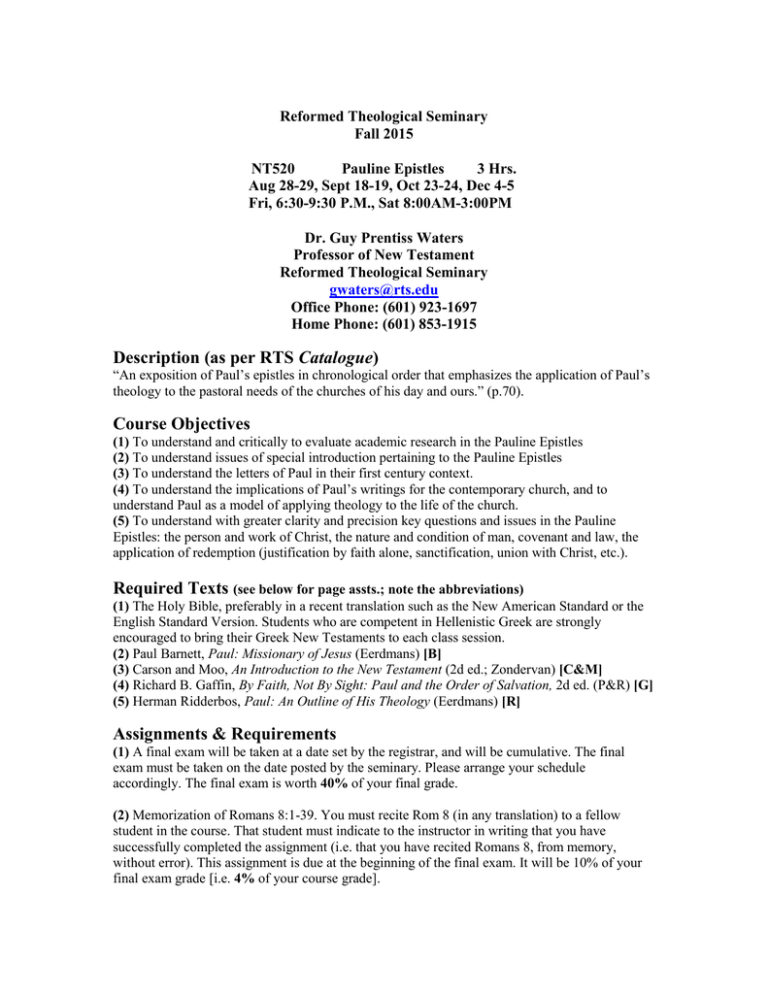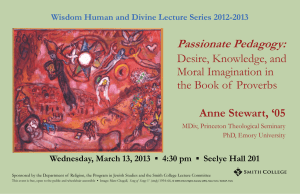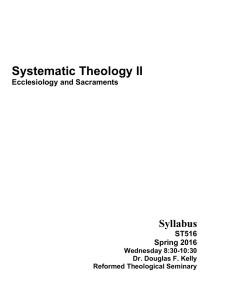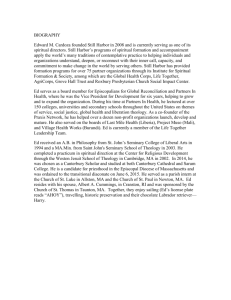Reformed Theological Seminary Fall 2015 NT520
advertisement

Reformed Theological Seminary Fall 2015 NT520 Pauline Epistles 3 Hrs. Aug 28-29, Sept 18-19, Oct 23-24, Dec 4-5 Fri, 6:30-9:30 P.M., Sat 8:00AM-3:00PM Dr. Guy Prentiss Waters Professor of New Testament Reformed Theological Seminary gwaters@rts.edu Office Phone: (601) 923-1697 Home Phone: (601) 853-1915 Description (as per RTS Catalogue) “An exposition of Paul’s epistles in chronological order that emphasizes the application of Paul’s theology to the pastoral needs of the churches of his day and ours.” (p.70). Course Objectives (1) To understand and critically to evaluate academic research in the Pauline Epistles (2) To understand issues of special introduction pertaining to the Pauline Epistles (3) To understand the letters of Paul in their first century context. (4) To understand the implications of Paul’s writings for the contemporary church, and to understand Paul as a model of applying theology to the life of the church. (5) To understand with greater clarity and precision key questions and issues in the Pauline Epistles: the person and work of Christ, the nature and condition of man, covenant and law, the application of redemption (justification by faith alone, sanctification, union with Christ, etc.). Required Texts (see below for page assts.; note the abbreviations) (1) The Holy Bible, preferably in a recent translation such as the New American Standard or the English Standard Version. Students who are competent in Hellenistic Greek are strongly encouraged to bring their Greek New Testaments to each class session. (2) Paul Barnett, Paul: Missionary of Jesus (Eerdmans) [B] (3) Carson and Moo, An Introduction to the New Testament (2d ed.; Zondervan) [C&M] (4) Richard B. Gaffin, By Faith, Not By Sight: Paul and the Order of Salvation, 2d ed. (P&R) [G] (5) Herman Ridderbos, Paul: An Outline of His Theology (Eerdmans) [R] Assignments & Requirements (1) A final exam will be taken at a date set by the registrar, and will be cumulative. The final exam must be taken on the date posted by the seminary. Please arrange your schedule accordingly. The final exam is worth 40% of your final grade. (2) Memorization of Romans 8:1-39. You must recite Rom 8 (in any translation) to a fellow student in the course. That student must indicate to the instructor in writing that you have successfully completed the assignment (i.e. that you have recited Romans 8, from memory, without error). This assignment is due at the beginning of the final exam. It will be 10% of your final exam grade [i.e. 4% of your course grade]. (3) Read the Pauline Epistles in English (sans Romans). You must read these PE in their entirety this semester. This assignment is due at the beginning of the final exam. You will be asked to give a percentage reflecting the extent of your reading. This assignment will be 10% of your final exam grade [i.e. 4% of your course grade]. (4) Reading Digests. 40% of your final grade (a) To read and to prepare a digest of Barnett, Paul: Missionary of Jesus. See attached guidelines. Due Aug 28. Late work will subject your work to reduction of one full letter grade per day late (or fraction thereof). 10% of the final grade. (b) To read in full and to prepare a digest of See attached guidelines. Carson and Moo, Introduction (2d ed.), Chaps. 8-9, 11-18. Due Sept 18. Late work will subject your work to reduction of one full letter grade per day late (or fraction thereof). 5% of the final grade. (c) To read in full and to prepare a digest of Ridderbos, Paul: An Outline of His Theology, I-VII, XII (only). See attached guidelines. Due Oct 23. Late work will subject your work to reduction of one full letter grade per day late (or fraction thereof). 5% of the final grade. (d) To read in full and to prepare a digest of Gaffin, By Faith and Not By Sight. See attached guidelines. Due Dec 4. Late work will subject your work to reduction of one full letter grade per day late (or fraction thereof). 10% of the final grade. (5) An Exegetical Working Paper. See guidelines below. Complete the assignment according to the category in which you fall: (a) For those who have had Greek, the assignment will be to translate the passage into English (without using an English translation) and to parse all verbs and verbal forms (without using parsing helps of any kind). Then list five (5) exegetical observations per verse based on the Greek text. It is recommended that students use commentaries or other books to help gather these observations. (b) For those non – M.Div. students or M.Div. students who have not had Greek, the assignment is to outline the passage and list 10 exegetical, theological, or practical observations per verse. It is recommended that students use commentaries or other books to help gather these observations. This assignment is worth 20% of your final grade (10% each). It is due at the beginning of class, Dec 4. This assignment will be accepted late, but will be subject to a penalty of one letter grade per day (or fraction thereof) after the due date. You will prepare Phil 2:5-11. Attendance Class attendance is required for NT 520. If a student anticipates an unavoidable absence, he should notify the instructor in advance. Each hour of unexcused absence subjects the student to reduction of his final grade by one-half of a letter grade. Two tardies (arriving after the beginning of the hour) constitute an hour of unexcused absence. Students missing more than one session (for any reason) may either submit an additional, compensatory assignment [determined by the instructor] or choose to receive a full letter grade reduction in their final grade. Grading Scale The grading scale for this course is the seminary’s grading scale. You may find it listed in the RTS Catalog. Plagiarism Please review the seminary’s policy on plagiarism. Plagiarized work will subject the student to failure in the course and possible disciplinary action. 2 In-Class Computer Use Computers and tablets are permitted in this course for course-related purposes only. Cell phones must be set to silent and stowed. If for some extraordinary reason you need to take a call, you may either wait until the break or leave the classroom. Approximate Course Schedule Please note that this schedule is approximate and subject to change at any time. The instructor’s announced changes in class will be the final word on the nature and date of assignments. They are the student’s sole responsibility to note and to implement. Aug 28-29 Course Introductions Introduction to Paul and the Pauline Epistles Historical Critical Study of Paul The Life of Paul Sept 18-19 1-2 Thessalonians Galatians Oct 23-24 1-2 Corinthians Dec 4-5 Philippians, Philemon Colossians, Ephesians Pastoral Epistles Paul & The Letters of Paul in Church History “At length they saw a man coming (namely Paul), of a low stature, bald (or shaved) on the head, crooked thighs, handsome legs, hollow-eyed; had a crooked nose; full of grace; for sometimes he appeared as a man, sometimes he had the countenance of an angel.” Acts of Paul and Thecla, 1.7 “With avid intensity I seized the sacred writings of your Spirit and especially the apostle Paul. Where at one time I used to think he contradicted himself and the text of his words disagreed with the testimonies of the law and the prophets, the problems simply vanished. The holy oracles now presented to me a simple face, and I learnt to ‘rejoice with trembling’ (Ps. 11:7).” Augustine, Confessions, VII.xxi (27) “Meanwhile in that same year, 1519, I had begun interpreting the Psalms once again. I felt confident that I was now more experienced, since I had dealt in university courses with St. Paul's Letters to the Romans, to the Galatians, and the Letter to the Hebrews. I had conceived a burning desire to understand what Paul meant in his Letter to the Romans, but thus far there had stood in my way, not the cold blood around my heart, but that one word which is in chapter one: "The justice of God is revealed in it." I hated that word, "justice of God," which, by the use and custom of all my teachers, I had been taught to understand philosophically as referring to formal or active justice, as they call it, i.e., that justice by which God is just and by which he punishes sinners and the unjust. 3 But I, blameless monk that I was, felt that before God I was a sinner with an extremely troubled conscience. I couldn't be sure that God was appeased by my satisfaction. I did not love, no, rather I hated the just God who punishes sinners. In silence, if I did not blaspheme, then certainly I grumbled vehemently and got angry at God. I said, "Isn't it enough that we miserable sinners, lost for all eternity because of original sin, are oppressed by every kind of calamity through the Ten Commandments? Why does God heap sorrow upon sorrow through the Gospel and through the Gospel threaten us with his justice and his wrath?" This was how I was raging with wild and disturbed conscience. I constantly badgered St. Paul about that spot in Romans 1 and anxiously wanted to know what he meant. I meditated night and day on those words until at last, by the mercy of God, I paid attention to their context: "The justice of God is revealed in it, as it is written: 'The just person lives by faith.'" I began to understand that in this verse the justice of God is that by which the just person lives by a gift of God, that is by faith. I began to understand that this verse means that the justice of God is revealed through the Gospel, but it is a passive justice, i.e. that by which the merciful God justifies us by faith, as it is written: "The just person lives by faith." All at once I felt that I had been born again and entered into paradise itself through open gates. Immediately I saw the whole of Scripture in a different light. I ran through the Scriptures from memory and found that other terms had analogous meanings, e.g., the work of God, that is, what God works in us; the power of God, by which he makes us powerful; the wisdom of God, by which he makes us wise; the strength of God, the salvation of God, the glory of God. I exalted this sweetest word of mine, "the justice of God," with as much love as before I had hated it with hate. This phrase of Paul was for me the very gate of paradise. Afterward I read Augustine's "On the Spirit and the Letter," in which I found what I had not dared hope for. I discovered that he too interpreted "the justice of God" in a similar way, namely, as that with which God clothes us when he justifies us. Although Augustine had said it imperfectly and did not explain in detail how God imputes justice to us, still it pleased me that he taught the justice of God by which we are justified.” Martin Luther, 1545 (LW 4:421-428, trans. Andrew Thornton, OSB; © 1983, St. Anselm Abbey) “In the evening I went very unwillingly to a society in Aldersgate Street, where one was reading Luther’s preface to the Epistle to the Romans. About a quarter before nine, while he was describing the change which God works in the heart through faith in Christ, I felt my heart strangely warmed. I felt I did trust in Christ, Christ alone, for salvation; and an assurance was given me that He had taken away my sins, even mine, and saved me from the law of sin and death.” John Wesley, The Journal of John Wesley “The Reformation fought and conquered in the name of Paul” Albert Schweitzer, The Mysticism of Paul the Apostle 4 Exegetical Assignments Your exegetical assignment is an opportunity for you to work closely with a particular passage in the Pauline epistles. For those who have had Greek, the assignment should follow the following format: Typewritten (no handwritten assignments accepted) Verse-by-verse translation Parsing given, in order, after each verse. Parsing should follow the format you learned in Mounce. Exegetical observations in a separate section following your translation and parsings. What follows are some guidelines to help you prepare a strong exegetical assignment. Avoid making observations that simply restate the passage in different words; or that are pedestrian. Instead, make observations that draw out the passage’s meaning and significance. Avoid pointing out obvious grammatical or syntactical facts, i.e., “this noun is a genitive;” “this verb is in the aorist;” “this statement is a conditional clause.” Instead, explain the significance of your grammatical and syntactical observations. Avoid making arguments based on the aspect of the verb or verbal. Instead, make arguments that can be supported by other considerations. Avoid drawing observations without reference to the statements or paragraphs immediately preceding or following the verse in question. This does not mean that every observation should make such references. Rather, make sure that you do not overlook this important element of exegesis. Instead, try, as much as possible, to incorporate the immediate context of the passage and the context of the letter as a whole into your observations. If a word or concept finds meaningful parallel elsewhere in the letter or the Pauline corpus, reference it. Avoid making unsubstantiated assertions. Instead, take time to defend the claims that you make from the text. Avoid submitting an assignment with incomplete parsing (for those to whom this applies). Instead, for those of you parsing, be sure to parse ALL verbs and verbals in the way that you were instructed; and to include the verb(al)’s lexical form. Avoid simply quoting a commentary or other secondary source, especially without comment. Instead, when quoting or referencing a secondary source, be sure to indicate why that quote/reference is exegetically significant. Guidelines – Digests (adapted from Dr. Richard B. Gaffin, Jr.’s guidelines) Please prepare a digest of each assigned reading, double-spaced or 1.5 spaced. A written digest is not simply a repetition but a summary or overview organized to highlight the author’s main ideas 5 and distinctive emphases. It may have one of several formats – an outline, a running commentary, a series of brief paragraphs. It should be concise without being superficial. A digest is not a response paper. I want to see that you have understood what you have read. Your digests should be not longer than 10 pages each. 6 Course Objectives Related to MDiv* Student Learning Outcomes Course: Professor: Campus: Date: Pauline Epistles Waters Houston Fall 2015 MDiv* Student Learning Outcomes In order to measure the success of the MDiv curriculum, RTS has defined the following as the intended outcomes of the student learning process. Each course contributes to these overall outcomes. This rubric shows the contribution of this course to the MDiv outcomes. Rubric Mini-Justification Strong Moderate Minimal None *As the MDiv is the core degree at RTS, the MDiv rubric will be used in this syllabus. Articulation (oral & written) Scripture Broadly understands and articulates knowledge, both oral and written, of essential biblical, theological, historical, and cultural/global information, including details, concepts, and frameworks. Significant knowledge of the original meaning of Scripture. Also, the concepts for and skill to research further into the original meaning of Scripture and to apply Scripture to a variety of modern circumstances. (Includes appropriate use of original languages and hermeneutics; and integrates theological, historical, and cultural/global perspectives.) Strong Reformed Theology Significant knowledge of Reformed theology and practice, with emphasis on the Westminster Standards. Moderate Sanctification Demonstrates a love for the Triune God that aids the student’s sanctification. Moderate Personal application is made in class from many texts of the PE Desire for Worldview Burning desire to conform all of life to the Word of God. Moderate Winsomely Reformed Embraces a winsomely Reformed ethos. (Includes an appropriate ecumenical spirit with other Christians, especially Evangelicals; a concern to present the Gospel in a God-honoring manner to non-Christians; and a truth-in-love attitude in disagreements.) Ability to preach and teach the meaning of Scripture to both heart and mind with clarity and enthusiasm. Moderate Multi-faceted applications are made from texts of the PE, e.g. church & politics Historical-critical scholarship is discussed and engaged in class and readings. Moderate Many times, preaching applications are made from the texts of the PE Worship Knowledgeable of historic and modern Christianworship forms; and ability to construct and skill to lead a worship service. Minimal Lectures discuss New Covenant worship from the PE. Shepherd Ability to shepherd the local congregation: aiding in spiritual maturity; promoting use of gifts and callings; and encouraging a concern for non-Christians, both in America and worldwide. Minimal Jesus’ establishment of the church; appointment of church officers discussed. Preach Strong 1. Theology of the PE 2. Exegetical written assignment on a theology topic in the PE 1. Major part of class is exegeting the PE 2. Original languages are used in class and encouraged in writing assignment 3. It’s a BIBLE Class! Traditional Reformed categories are used for explaining many categories of the PE 7 Church/World Ability to interact within a denominational context, within the broader worldwide church, and with significant public issues. Moderate Global character of the people of God is emphasized 8


